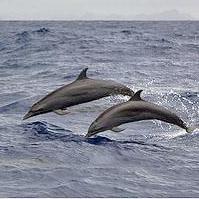 南太平洋島國帛琉公開聲明,該國專屬經濟區內的所有水域都將成為海洋哺乳類保護區,以保護鯨豚與儒艮。
南太平洋島國帛琉公開聲明,該國專屬經濟區內的所有水域都將成為海洋哺乳類保護區,以保護鯨豚與儒艮。
帛琉的環境、自然資源與旅遊部部長佛里茲(Harry Fritz) 23日於名古屋生物多樣性公約大會的海洋日記者會上,代表總統托里比昂(Johnson Toribiong)宣告這處60萬平方公里的新保護區。
佛里茲表示:「從遠古時代至今,我們一向藉著傳統律法(Bul)、暫時禁捕令,與保護重要區域這些方式,來保育生物多樣性。」
「生物多樣性一直是帛琉文化中不可或缺的一部分。」他說:「我們傳統上的認同、價值、傳說與習俗,和我們的週遭環境與我們與生物的關係都密切相關。生物多樣性的保育深植於我們的日常生活態度裡,並內化在我們用語的含義之中。」
帛琉是一座島嶼位置集中的群島,其水域中至少擁有11種鯨豚類動物,包括一個抹香鯨的繁殖種群,可能有多達30種其他的鯨豚種類在此出沒。而帛琉的儒艮則是世界上最為孤立與瀕危的族群,佛里茲如此說明。
佛里茲表示:「保護區將推動永續賞鯨旅遊,這已經是成長數百萬美元的全球產業,是帛琉民眾的一個經濟契機。」
帛琉的主要經濟來源是旅遊業,此外,全球最大的海豚研究機構「太平洋海豚灣公司」(Dolphins Pacific)以及專精熱帶珊瑚礁的現代化水族館暨研究機構「帛琉國際珊瑚礁中心」(Palau International Coral Reef Center)都位於帛琉。此區域水面下的生物多樣性十分壯觀,包括超過1500種的魚類與700種的珊瑚和海葵。
太平洋島嶼區(Pacific Islands Region) 海洋哺乳類數量已經大幅減少,這是因為19世紀,特別是在20世紀之中,對海洋哺乳類進行的捕獵行為,而捕獵者大多數是來自外國。」佛里茲表示:「國際捕鯨委員會已承認,有明確科學證據指出太平洋島嶼區裡,有許多大型鯨魚種類受到過去捕鯨的影響,其數量目前仍然極為稀少。」
「這是一個確實的科學原則,要保護遷徙物種,不僅必須保護牠們的覓食區與遷徙路徑,也要保護繁殖場域。」佛里茲說。
建立保護區的目的在於禁止蓄意獵捕或騷擾任何海洋哺乳動物。
然而帛琉僅有一艘巡邏船用來巡邏,而負責的水域廣大,面積僅比美國德州略小。這艘船由澳洲提供,但由帛琉政府負責運作。
佛里茲表示,帛琉正向鄰國尋求支援,協助巡邏與監控該國專屬經濟海域中是否有人非法捕獵海洋哺乳動物。
直到現在,帛琉都在國際捕鯨委員會年會上投票支持日本商業捕鯨的提議,而海洋哺乳類保護區的設立被視為信號,意即日本可能不能再把帛琉算進支持捕鯨的票數裡了。
當被問及新的海洋哺乳類保護區是否會影響到帛琉與日本的關係,佛里茲表示,帛琉現在表明立場,而這將會「讓朋友能夠理解」。
The South Pacific island nation of Palau has declared all the waters within its Exclusive Economic Zone to be a marine mammal sanctuary for the protection of whales, dolphins, and dugongs.
Harry Fritz, Palau's minister of the environment, natural resources and tourism, announced the new 600,000 square kilometer (231,660 square mile) sanctuary on behalf of President Johnson Toribiong at a news conference Saturday during Oceans Day at the Convention on Biological Diversity meeting in Nagoya.
"From ancient times to today we have conserved our biodiversity through the tools of "bul" or moratoria, and protection of critical areas," said Fritz.
"Biodiversity has always been integral to the Palauan culture," he said. "Our traditional identity, values, legends, and practices are intimately linked to our surroundings and to our relationships with living creatures. Conservation of biodiversity is ingrained in our daily approach to life and inherent in the meaning of our words."
A close group of islands, Palau has at least 11 species of cetaceans in its waters, including a breeding population of sperm whales and as many as 30 other species of whales and dolphins. Palau's dugongs are the most isolated and endangered population in the world, said Fritz.
"This sanctuary will promote sustainable whale-watching tourism, already a growing multi-million dollar global industry, as an economic opportunity for the people of Palau," Fritz said.
Much of Palau's economy comes from tourism and the country hosts Dolphins Pacific, the world's largest dolphin research facility, and the Palau International Coral Reef Center, a modern aquarium and research facility specializing in tropical coral reefs. The region's spectacular underwater biodiversity includes over 1,500 species of fish and 700 species of coral and anemone.
"The hunting of marine mammals, largely by foreign countries, in the 19th and particularly the 20th centuries has dramatically reduced populations in the Pacific Islands Region," he said. "The International Whaling Commission has recognized that there is clear scientific evidence that in the Pacific Islands region many of the great whale species remain severely depleted in numbers, due to the impacts of past whaling."
"It is a well-established scientific principle that to protect migratory species it is necessary to protect them not only in their feeding areas and migratory routes but also in their breeding grounds," Fritz said.
Establishment of the sanctuary is intended to prohibit the deliberate hunting and harassment of any marine mammals.
But Palau has only one patrol boat at its disposal to patrol waters that cover an area just a little smaller than the U.S. state of Texas. The boat is supplied by Australia and operated by the government of Palau.
Fritz said that Palau is seeking assistance from neighboring countries in patrolling and surveillance of its EEZ for illegal taking of marine mammals.
Until now, Palau has voted with Japan in favor of commercial whaling at the annual meetings of the International Whaling Commission, and the establishment of its marine mammal sanctuary is viewed as a signal that Japan may no longer be able to count on Palau's vote for whaling.
Asked whether the new marine mammal sanctuary will affect Palau's relationship with Japan, Fritz said Palau is now making its position known and that it will be "understood by friends."
全文及圖片詳見:ENS報導




